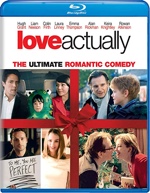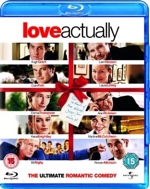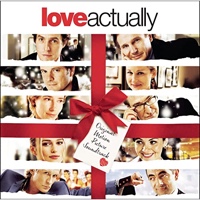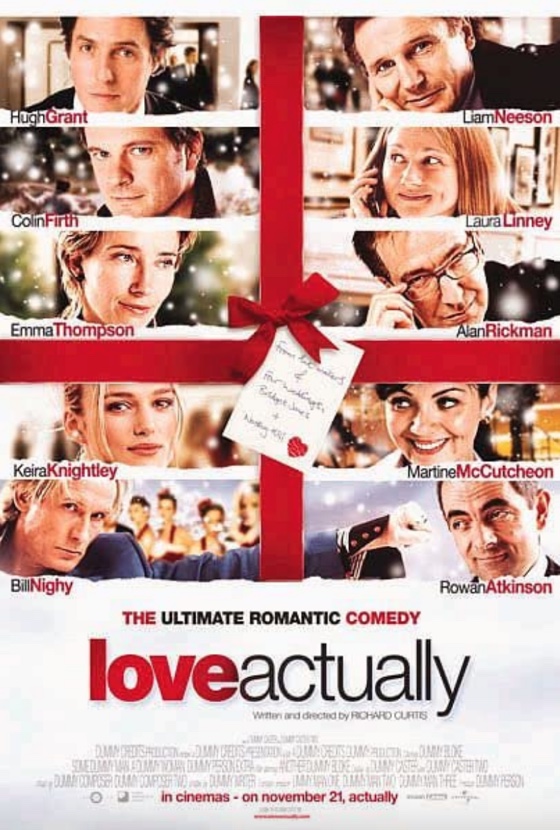Fool for Love
You know me. You know I hate romantic comedies, mostly. You know I think they tend to be phony, they tend to show off the worst sides of both men and women, and they tend to be neither romantic nor comedic. So you gotta be suspecting that a film billed as “the ultimate romantic comedy” would have me running screaming in opposite direction as if my life depending upon escape.
So you gotta know that when I tell you not to miss Love Actually, and to bring all your friends, and to tell all the friends you can’t take to go on their own, it’s gotta be something really special. And it is, it really, really is. This is a perfectly wonderful, perfectly foolish movie, in that fool-for-love kind of way. It’s a movie that makes you wish you could run out and fall in love, like it was something you could order out for and have delivered.
And the experience of this film was, for me, like that lightning bolt of falling in love at first sight. True, I went into the film hoping for good things, with this cast, an Anglophile’s dream — Emma Thompson, Colin Firth, Alan Rickman, Rowan Atkinson, Liam Neeson, and more — and the fact that it was written and directed (his debut behind the camera) by Richard Curtis, who wrote The Tall Guy, one of my favorite films that no one else has seen, and created (with Atkinson) Blackadder, which warps my brain so delightfully. (Curtis also wrote Bridget Jones’s Diary and Notting Hill, but I don’t hold that against him.) But I wasn’t expecting to instantly go head-over-heels. From practically the moment the lights go down and the screen lights up, I succumbed to sobby, sniffling tears that I’m still not even sure why I was crying. Except that this is a film so full of tenderness and longing, of sacrifice and devotion, from the very first moment, that it’s overwhelming, and enchantingly so, and the only possible emotional reaction is to have a good, satisfying cry that lasts its entire running time.
The really terrific thing is that Love Actually, while it certainly lives up to its “ultimate romantic comedy” label, is a celebration of all kinds of love — between siblings, between parents and children, among lifelong friends of all stripes… and between lovers and would-be lovers, of course, too. There’s Neeson’s (Gangs of New York, Star Wars: The Phantom Menace) Daniel, who’s just lost his wife, and his now-orphaned 11-year-old stepson, Sam (Thomas Sangster), whose moodiness, Daniel discovers to his great surprise, is not down to his mother’s death but to “the total agony of being in love” with a girl at school who doesn’t know he exists. There’s the new bachelor prime minister (Hugh Grant: Two Weeks Notice, About a Boy), who falls instantly for a Downing Street secretary Natalie (Martine McCutcheon), while his sister, Karen (Thompson: Treasure Planet, Primary Colors), worries about losing her husband, Harry (Rickman: Harry Potter and the Chamber of Secrets, Galaxy Quest), to a pretty, and pretty aggressive, coworker, Mia (Heike Makatsch: Resident Evil, Longitude), while also trying to fix up two other officemates, Sarah (Laura Linney: Mystic River, The Life of David Gale) and Karl (Rodrigo Santoro: Charlie’s Angels: Full Throttle). And that’s only the half of it. And the course of no one’s true love runs smooth.
Oh, and this is all happening in the weeks leading up to Christmas, with its big love-in of a climax coming on Christmas Eve. (Heh, I said “climax” and “coming” — but this ain’t all just about pure, idealistic love; sex and lust play a big part, too.) It’s all saved from sappy schmaltz by its typically British, typically Curtis sense of humor, one that punctures all hints of mawkishness the moment it threatens to intrude: the absurd Christmas pop song by has-been rock star Billy Mack (Bill Nighy: Underworld, I Capture the Castle, who, in a cast of scene-stealers, just about steals the movie) and the love he unexpectedly discovers; the supercilious department store clerk Rufus (Atkinson: Johnny English, Scooby-Doo), a bane to Christmas shoppers; the shy young couple (Martin Freeman and Joanna Page: From Hell, The Lost World) who meet while working as on a movie set as stand-ins for actors in a sex scene, a bewitching separation of the mere mechanics of sex from the magic of attraction.
Some will say Curtis has tried to pack too many stories into a single film, but every character is worth spending time with — they’re all people you wish you knew, real and flawed and thoroughly engaging, and I felt like I could have watched another two hours of them fumbling their way through the messy misery of falling in love or staying in love or loving all the other people in their lives that they’re not sleeping with (or hoping to sleep with). And the charming jostling of all these many enchanting people is the entire point of Curtis’s gloriously untidy film: “Love actually is all around.”




















[originally posted to Flick Filosopher 01.2004; reposted by maj]
Subject: A Modest Proposal
From: Mike_Lang@aoncons.com
I have never felt so compelled to vent my displeasure over a movie. But frankly I place much of the blame on you, yes you oh mighty Flick Filosopher, so here goes (Besides, my wife is tired of hearing about it).
In a year in which our first child was born, our normally frequent movie-going experiences were severely curtailed. What 2003 did give us, however, was an almost unprecedented impeccable viewing record – Lost in Translation, Return of the King, A Mighty Wind, Pirates of the Caribbean, American Splendor, Spellbound. Exceptional movies all, and all highly recommended by our cinematic oracle, the Flick Filosopher.
Then we decided to introduce our son to the world of film in our local second-run movie house, which has Baby Brigade night for those with young ‘uns (It also has beer, pizza, and comfortable old couches – http://www.picturepubpizza.com for a random plug of a great little venue). Anywho, we went with the little tike to see “Love Actually” which, I think it is important for anyone who has movie-spending dollars in their pocket and isn’t a monosyllabic mouthbreather to know, is shit actually.
I really don’t make a habit of ruining the movie experiences of others by criticizing films they have liked. I also don’t believe it is possible to change a person’s initial reaction to a movie. But I ask, no, beg you to watch this movie again.
I am not going to resort to the standard criticisms of Richard Curtis, though I certainly could say that portraying a “cross section” of a London where everybody is fabulously pretty, fabulously well-off, and every man has a woman out there for him who could pass for his daughter is dishonest (And I thought you didn’t like “Something’s Gotta Give”…). But the movie is fantastically dishonest in so many other respects. We are asked to accept that the gunshy Laura Linney has a co-worker she is attracted to that is equally as gunshy, except for the fact that he is basically a supermodel, the kind of guy that none of us has ever seen working in an office anywhere. Oh, but he wears glasses so he must be shy and bookish. We are asked to accept that it is endearing, in a post-9/11 world, when a young boy busts through airport security and outraces them to say goodbye to his paramour. We are also asked, just minutes earlier, to find that same 11 year old paramour endearing when she belts out a sexy Christmas song and struts across the school stage like a tarted-up Jon Benet Ramsey. We are asked to accept that it’s cute that a real guy’s guy secretly announces to his best friend’s wife that he loves her, about 2 weeks after their wedding at which he was the best man. And worst of all, we are asked to accept these four words – Hugh Grant, Prime Minister. I was perfectly willing to go along with this and perfectly willing to like the movie if they could sell me on this point. But when Hugh Grant acts like, well, Hugh Grant, and when he struts through #10 Downing like Tom Cruise in tighty whities, well sir, that product I’m not buying.
What makes this one of the worst movies in recent memory is this very same
dishonesty. At least “Judge Dredd” did not purport to be realistic in any way, and I don’t remember “Roadhouse” asking for any Academy Awards. But this abomination, though a romantic comedy, does have to have some footing in reality (And it is asking for Oscar nominations, perish the thought). The movie’s ridiculousness can be broken down to small moments – Billy Bob Thornton, as the American president, ogles the staff immediately after meeting the Prime Minister for the first time; a young Brit scores a bevy of hot babes in the first bar in Milwaukee he walks into, a scene meant to be funny but was so implausible I found myself hoping it was a cheesy dream sequence; the lovesick best man fools his apparently clueless buddy into thinking a clearly professional, studio-produced CD is a pack of carolers at the front door. It’s ok to ask the audience to buy these preposterous scenes in a Farrelly brothers, or an action movie, or even a musical, where the audience knows that it is stepping into a world where things happen easily and happily suspend their disbelief. Not here.
And when it comes right down to it, this movie (I’m physically unable to say the name again) is just misguided and wrong at its heart. It has far too many stories and characters and not the time to develop any single one of them. Christ, it took an entire movie to sell Michael Douglas as the President, but it would take a four hour epic, if not a box set, to sell Hugh Grant as the Prime Minister. I didn’t buy into any of these characters or their stories, and the movie didn’t make any attempt to persuade me. It’s lazy filmmaking, and lazy writing, and let’s be honest here – if this was a Hollywood movie, with American actors and American accents, it would be howled off the screen. Better yet, it would have been howled off the studio lot 30 seconds into the pitch.
Is there anything to recommend about the movie? Yes. Bill Nighy as the aging rock star was the only one to pull himself out of this wreckage unscathed. Hilarious and worthy of much more screen time. The funny thing is, of all the characters in the film he is the one that means the very least to it. In fact, except for a throw-in non sequitor of a scene where he proclaims his “true love”, he has nothing to do with what the film is ultimately trying to say. Normally, it would make me mad in that they added an entire storyline that should easily have been cut out of the movie (see Gump, Forrest – jogging). In this case, however, I was more than happy to have something to prevent me from slitting my wrists with a plastic knife.
I know I’m lancing windmills here, Flick Filosopher, but for god’s sake watch this thing again. Please do what you can do preserve my last sliver of hope in humanity.
I responded back then:
Love Actually worked for me. It didn’t work for you. There’s probably nothing I could say to change your mind, and I would try to. But I’ll just comment quickly on some of what you said.
Not true. The Downing Street secretary clearly is from, at best, a middle-class neighbor (and is still living with her parents!), and not all the couples had great disparities in their ages. Certainly not the triangle with Keira Knightley, nor Rickman and Thompson, nor Linney and her hunk, nor Firth and his housekeeper.
I think the asinine lengths to which airport “security” has gone certainly deserves some skewering.
I don’t think we’re meant to find that “cute” — I didn’t. It was, at best, bittersweet.
I’m sorry you were disappointed with my review, but I don’t imagine that seeing the film again will dramatically change my opinion of it. I was charmed by it. It’s a fantasy, and it’s silly in a lot of places, but that’s part of why I liked it. Sorry.